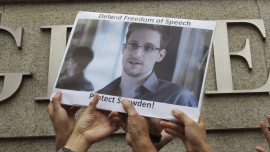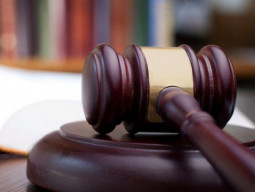
WARSAW: Lawyers for a man who alleges he was held in a secret CIA jail in Lithuania have accused the Baltic state of failing to give proper answers to judges considering the case at the European Court of Human Rights.
Saudi-born Abu Zubaydah alleges that he was held, seven years ago, in Lithuania as part of a global CIA programme to detain and interrogate suspected al Qaeda operatives.
Abu Zubaydah, now an inmate at the US military prison in Guantanamo Bay, has asked the Strasbourg-based court to rule that Lithuania acted illegally.
The European Court of Human Rights (ECHR) has agreed to consider the case, and addressed a series of questions to Lithuania about whether the CIA ever held Abu Zubaydah there, and how much the government knew about it.
Abu Zubaydah's lawyers say he was seized in Pakistan 2002, and held in US government facilities on several continents before being flown in secret to Lithuania.
They accuse Lithuania of stonewalling in response to the ECHR's questions by repeating old information and using procedural arguments to try to get the case dismissed.
"It is ironic that at the same time as Lithuania holds the EU presidency it shows such disdain for its European human rights obligations," said Helen Duffy, senior counsel for Abu Zubaydah on behalf of Interights, a human rights group.
Lithuania has just taken up the six-month, rotating presidency of the Council of the European Union, a high-profile role that involves hosting summits and representing the bloc to the outside world.
A representative of the Lithuanian government disputed the lawyers' criticism, and said it was up to the court itself to decide if the government has answered its questions.
The Lithuanian government has argued, among other things, that Abu Zubaydah's application to the ECHR was not valid because it did not bear his signature, and he had not signed an authorisation for his lawyers to lodge the case on his behalf.
His lawyers argued it is impossible for him to sign any application because the US military authorities treat all communications from him at Guantanamo Bay as classified information that cannot be made public.
The Lithuanian state is trying to "put an impossible burden on the applicant, hiding behind accusations that he failed to take steps that it is well known he is precluded from taking," the lawyers said in a submission to the court.
"The state asks the court to dismiss the applicant's claim on a plethora of grounds which are, in various ways, erroneous, misconceived, unsubstantiated and at times disingenuous," said the document.
On the allegations about the CIA jail, the lawyers said Lithuania "in fact provides no additional information. Nor does the state address the substance of the allegations against it."
Former Riding School
Elvyra Baltutyte, Lithuania's representative at the ECHR, told Reuters the court's rules required that anyone bringing a case sign an authorisation for their lawyers to represent them.
"The applicant's lawyers are free to comment on this point in their observations, as well as on other answers of the Lithuanian government to the court. However the ultimate evaluation of the observations will be done by the court itself," she said.
Abu Zubaydah's lawyers allege he was held by the CIA in Lithuania from early 2005 until March 2006, possibly in a former riding school near the capital that was converted into a jail.
Lithuania has denied that the CIA ever held detainees on its territory.
It says the allegations were based mainly on media reports citing unnamed sources, and on flight data which it said was inconclusive.
Officials say they held a parliamentary investigation into the allegations about a CIA jail and launched an investigation by prosecutors. They said neither found solid evidence the CIA held anyone on Lithuanian soil.


































































COMMENTS
Comments are moderated and generally will be posted if they are on-topic and not abusive.
For more information, please see our Comments FAQ